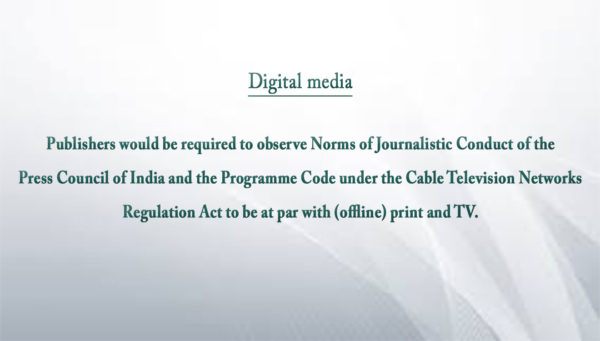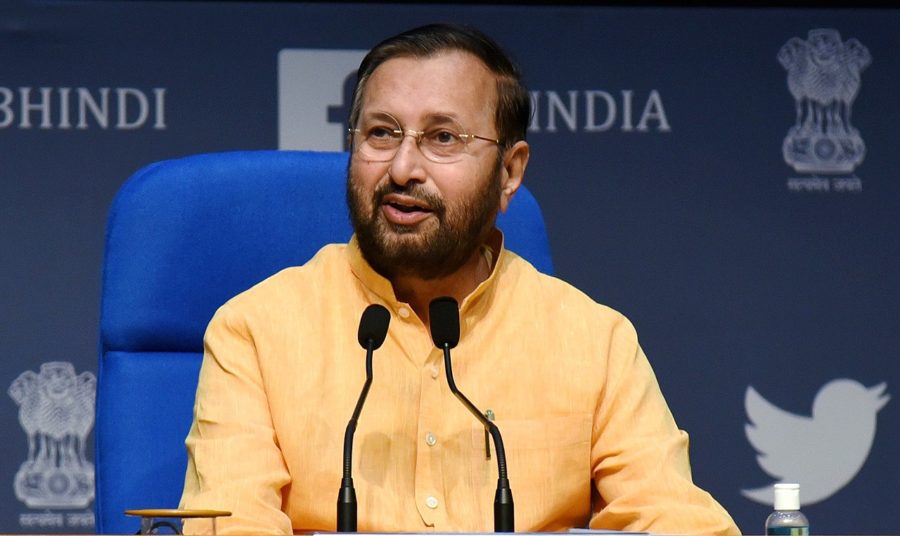The Ministry of Information and Broadcasting has denied the request from traditional print and television news media to exempt or exclude their extended digital news platforms from the Information Technology (Intermediary Guidelines and Digital Media Ethics Code) Rules 2021.
In an order passed on Thursday and published on Friday, the I&B Ministry said, “The rationale for including digital news portals/websites of organisations having traditional news platforms under the ambit of Digital Media Rules 2021 is well reasoned. Making any exception of the nature proposed will be discriminatory to digital news publishers who do not have a traditional TV/print platform.”
The order addressed to digital news publishers, publishers of online curated content (OTT platforms) and association of digital media publishers states that more than 500 publishers have already submitted details of compliance while several associations/organisations have informed the ministry regarding the setting up of self-regulatory bodies as per the Level II of the three-tier Grievance Redressal Mechanism under the new IT Rules.
On May 27, the News Broadcasters Association (NBA) wrote to the Union Minister of Information and Broadcasting Prakash Javadekar expressing their concerns over the new IT Rules and their applicability to the digital medium of the linear television channels of the members of NBA.
The NBA represents several national and regional private television news and current affairs broadcasters who run channels in Hindi, English, and regional languages.
In the letter, NBA mentioned that despite the IT Act, 2000 not contemplating the regulation of digital news media, the new IT Rules 2021 seek to include traditional news media, such as print and television news, having a digital news feed and presence on other digital platforms within its scope, which “ultra vires” the IT Act, 2000.
Recommended
The NBA’s principal concern, the letter further states, is the inclusion of the traditional electronic/television’s digital news media within the scope of the IT Rules, 2021, especially “since it is already sufficiently regulated by various Statutes, Laws, Guidelines and Codes, Regulations, and Judgements.”
To which, the Ministry said in the order that the new IT Rules would not amount to any “new or additional compliance” due to the existing regulations. “As already mentioned, since the Code of Ethics requires such digital platforms to follow the existing norms/content regulations which are in vogue for traditional print and TV media, there is no additional regulatory burden for such entities. Accordingly, the request for exempting digital news content of such organisations from the ambit of Digital Media Rules 2021 cannot be acceded to.”
Arguing that the Press Council Act merely covered the newspapers and not their news portals or websites, the order further said, “Content also differs across traditional and digital platforms. Accordingly, portals and websites even of organisations having traditional newspapers will be covered under the said rules.”

On February 25, the I&B Ministry released new guidelines to regulate content in OTT platforms, social media intermediaries and digital news media. According to the new guidelines, the “news and current affairs publishers are expected to follow the journalistic conduct of Press Council of India and the Programme Code under the Cable Television Network Act, which are already applicable to print and TV.”
Soon after, on March 11, Javadekar held a meeting with the members of the Digital News Publishers Association (DNPA), including India Today, Dainik Bhaskar, Hindustan Times, Indian Express, Times of India, Ananda Bazar Patrika, Eenadu, Dainik Jagran, Lokmat, addressing the new rules that “placed certain responsibilities on digital news publishers.”
A statement released after the meeting said that the media entities that were a part of the meeting welcomed the new rules and mentioned that television and print media “have been following the laid down norms of the Cable Television Network Act and the Press Council Act for a very long time” and same applies to the digital versions of publishing.



